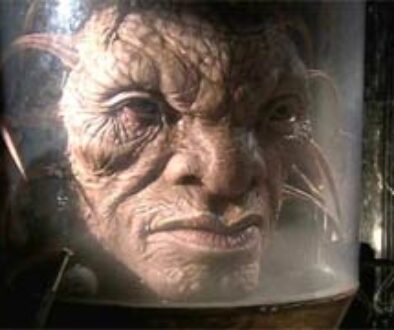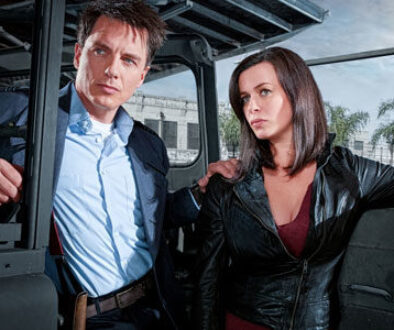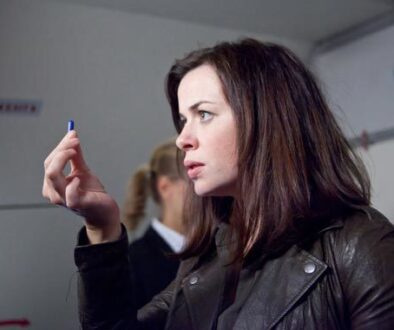Torchwood Miracle Day Episode 1 Review

Clint Hassell gives his verdict on the first episode of Torchwood Miracle Day – The New World.
In Torchwood: Miracle Day, the fourth series of the Torchwood franchise, mankind suddenly finds itself incapable of death. People continue to get sick, and injuries occur, yet every single person on the planet continues to live. With a population boom looming and panic beginning to spread, the American government seeks out the secret Torchwood Institute to help solve the mystery of the “miracle.” By combining more-compelling characters with a faster pace, increased action, and genuine humor, Miracle Day manages to recapture the feel of early Torchwood episodes while maintaining the epic-quality of the single-story format and the deeper philosophical ponderings of previous Torchwood offering, Children of Earth.
Originally a character created for Doctor Who, Captain Jack Harkness was once a Time Agent from the 51st Century, and then a time-lost con man, before becoming a companion of the time-and-space-faring Doctor. Dashing, mysterious, and omnisexual, Jack became the breakout character from the first series of the revived Doctor Who, and the character was granted immortality before being written off the series. The following year, Jack reappeared in the spin-off program, Torchwood. Picking up on plot threads from Doctor Who, the titular Torchwood Institute was responsible for collecting and investigating technology left behind by aliens pulled through a rift in space-time running through Cardiff, Wales. The first two series of Torchwood expanded Jack’s backstory to include an unscrupulous ex-partner, a traitorous brother, ex-wives who were seemingly decades older than he, a steamy inter-office romance, and the revelation that Captain Jack Harkness was neither a captain, nor really named “Jack Harkness.” Always willing to sacrifice lives – even those of loved ones – for the greater good (while ironically never able to lose his own), Jack continued to brood over the nature of his immortality and the revelation that he would continue to live as everyone he loved would grow old and die. During Torchwood’s third series, Children of Earth, Jack not only faced the death of his lover, but was forced to sacrifice the life of his own grandson, events which brought the formerly brash con man to his breaking point. Jack fled Earth and the Torchwood Institute to roam outer space and find a new life for himself.

When we first see Jack in Miracle Day, he seems to have returned to original form. He emerges from the shadows, charming and seductive, confident and cool, and a little bit dangerous. Where is his emotional baggage? The guilt over slain Torchwood members Suzie, and Toshiko, and Owen? The memories of Ianto he swore he “never could” forget, not in “a thousand year’s time”?
No, instead, it’s Gwen Cooper who is the most affected by the events of Children of Earth, having been reduced to a nervous shell of her former self. Paranoid, frantic, and scattered, Gwen has chosen an almost monastic existence in a secluded beach-front cabin to protect her husband, Rhys, and newborn daughter, Anwen. Seeing Gwen as a mother is delightful – her and Rhys’ moments of “domestic bliss” are a hilarious highlight of the episode, particularly because they involve automatic weapons – and it is a testament to Russell T Davies’ script that being a parent does not ruin Gwen’s character. Instead, parenthood provides the motivation to first renounce and then rejoin Torchwood. Previous series of Torchwood have always depicted Gwen as decisive and industrious, and it is to actress Eve Myles’ credit that she is able to portray Gwen as wounded and emotionally damaged and it not feel like a regression.

It would be so easy to write the character of Rhys Williams as ineffectual and plodding – thus accentuating Gwen’s talents and tenacity – or, as the worried husband, pleading for his wife to remain uninvolved. Miracle Day takes no such shortcuts. All of Gwen’s insecurities and neuroses are matched by Rhys’ strength and leadership, and, in fact, it is Rhys’ shelter and voice of reason that allow Gwen to continue functioning despite her guilt after the events of Children of Earth. There is no doubt that Rhys has become the leader of the Williams-Cooper household. Rather than portraying Rhys as trapped, now saddled with a damaged Gwen, Rhys is actively supportive. He takes up arms for Torchwood because it is a part of Gwen, not to free her from it. His love in unconditional, and when Rhys kisses Gwen, you truly believe it. (Oh, God, do you believe it.) The Rhys that welded a chainsaw against his own seemingly-zombified mother (leading to the single best use of the F-word in TV history) – he is front-and-center now, and it is Miracle Day’s biggest flaw that actor Kai Owen, promoted to third-billed-star status as of last series, is billed fifth in the opening credits.

The new characters all show varying levels of promise, but few receive enough attention in the script (or benefit from having appeared in the three previous Torchwood series) to feel fully realized. The most effective is Esther Drummond, a plucky, resourceful CIA agent whose dogged determination and industry uncover the secret origins on the clandestine Torchwood Institute. Because Miracle Day will be Torchwood’s introduction to a larger audience, the basic outline of the show’s setting, premise, and three returning main characters need to be re-explained. This is often done by introducing a new main character, an outsider to whom all necessary information can be relayed for the benefit of the viewing audience. Doctor Who pioneered this practice with its use of characters as “companions,” and Gwen served this function in Torchwood’s first series. Esther fills this role in “The New World,” and, in fact, goes through the exact same character arc as did Gwen in “Everything Changes” – almost plot point-by-plot point, in fact. Esther’s story will feel very familiar to long-time Torchwood fans, and that’s alright, because just as the audience fell in love with Gwen, they will similarly root for Esther. While she lacks Gwen’s wild fire, Esther is notable because she is lead not by her inquisitive nature, but by her heart. The scene where she reveals her true motives for investigating Torchwood are an emotional highlight of the episode, and should land actress Alexa Havins critical acclaim.

The breakout character of this series, however, will definitely be Rhys and Gwen’s daughter, Anwen, whose big, bright eyes are unblinking in the face of her struggling parents. Armed with a mischievous smile, Anwen is truly adorable and will win legions of fans, especially if the show continues to show her as giggling and excited in the midst of battles involving helicopters and semi-automatic weapons.
Less well-served by the script is CIA agent Rex Matherson, whose injury sidelines him to a hospital bed for the majority of the episode. The character is written as blustering, and actor Mekhi Phifer does little to overcome the stereotype. It doesn’t help that the script saddles him with inane scenes ranging from feebly humorous (his escape from the hospital) to the ludicrous (the show’s editing makes it appear that he accomplishes an impossible number of tasks while involved in the same phone call). Also, Rex’s lack of knowledge about Wales – ostensibly an in-joke to the country of Torchwood’s origin – makes the character seem uneducated and intolerant (and will probably raise protests from the Welsh fanbase). The character is not without hope, however. The scene where Rex realizes the personal effect the “miracle” has had on his life, is inspired (Why is he crying? Is he scared? Sad? Thankful? Humbled? Rattled?) and hints at the great depths accessible to the writers in future scripts. Also, Rex’s alpha dog personality should bring him into conflict with Jack’s leadership, which, though irritating to watch, will advance the plot while simultaneously allowing for the opposing viewpoints about the issues to be discussed.

New character Dr. Vera Juarez also feels incomplete – not because the character is lacking in screen time, but because the script has yet to give her much to do. Even with limited material, Arlene Tur is a fascinating actress to watch. As Miracle Day’s plot develops, Dr. Juarez should be forced to make ethical decisions in her treatment of the injured and (un-)dying that will enable the show to question the concepts of life’s “blessing,” death’s “curse,” and the true cost of healthcare. Provided an expanded storyline for her in future episodes, Dr. Juarez may rival Esther as the moral heart of the series.
Lacking in screen time, but better served by the script, is admitted pedophile and murderer, Oswald Danes. The script walks the fine line between overlooking Oswald’s crimes – which would be untrue to both Torchwood as a show and Danes’ character arc – and dwelling upon the horrors of his actions, which would be off-putting to the viewing audience. Newsreaders summarize Oswald’s conviction matter-of-factly, using choice quotes from his testimony to hint at the grisly nature of his crimes. This technique of Davies’ script establishes Danes as the most layered of the new characters, and left me eager to see how future episodes will continue to peel the away his monstrous actions to reveal some aspect of the human condition in his motives beneath. Provided actor Bill Pullman can restrain himself from reducing Oswald to a caricature of facial and verbal tics, Oswald will probably be the most-discussed character of this series.

Much has been made of the involvement of Starz, an American television network credited as co-producing Miracle Day with BBC Worldwide. Despite Starz having provided twice the amount of money for the production of Miracle Day than the BBC, fans have decried that the episodes will air in the U.S. six days before the U.K., and that the show has abandoned its original fans in the U.K. only to be “Americanized” into something unrecognizable as Torchwood. Thankfully, while the lavish advertising campaign financed by Starz, including premiere screenings attended by network representatives, indicates that the network takes great pride in adding Torchwood to its roster of programs, the series itself seems unaffected by the behind-the-scenes changes. True, the plot does start in the United States, but Wales is featured with equal prominence. More importantly, as Russell T Davies remains in charge as executive producer, the entire series retains its very “British” feel. For example, Miracle Day opens with Danes’ botched execution. Many British viewers may consider this the most “American” moment of the episode, as the United States is one of the very few developed countries to still practice capital punishment; however, because the scene disturbingly (though completely inaccurately) depicts what would have been Oswald’s final moments, the viewer is led to condemn not Oswald, but the American justice system. Thus, an “American” moment is actually viewed from a very “British” stance. Fear not fans, Miracle Day does not shy away from Torchwood’s rich history – previous characters, plot points, recurring themes, story beats, and in-jokes all get referenced.

Children of Earth benefited by being aired over five consecutive nights; because the next installment of the series was but a day away, the episodes could afford to plod along, weighed down by the heavy plot and its frightened characters. Russell T Davies and his fellow writers realize that, to maintain interest in a weekly series, the narrative must move forward at a brisk pace. Miracle Day seems to race past, its 50-minute run time escaping in what seems to be half that. The action sequences are big and impressive. In one scene, a helicopter flies sideways, which elicited first cheers of excitement and then applause from the audience at the preview screening. If for no other reason, British audiences should be thankful for the influx of Starz’s money to the special effects budget. Miracle Day also benefits from many moments of genuine levity – almost completely absent from Children of Earth – spread liberally throughout the episode.
More impressively, Miracle Day has already begun to verbalize the deeper philosophical questions regarding its premise. How does a person deal with not dying? Is an impossibly-alive person still a “victim”? Is he even still a “person,” and, if so, does he still warrant the same rights and care as a healthy person? Does he heal or will he continue to feel pain forever? How will the burgeoning world population affect society? The fighting in Somalia stops because the army cannot bear to continue a pointless fight against an unkillable opponent; meanwhile North Korea sees its population as immortal soldiers and takes up arms. What will happen when food stores are depleted? And, most importantly, what happens when the “miracle” stops?

The episode is not perfect. There are minor plot holes. (After the world-wide effects of Children of Earth, it is difficult to believe that a high-ranking CIA operatives like Esther and Rex wouldn’t grasp the deeper meaning of “the 456.” Two people – – one of whom not blessed with “miracle” immortality – take a 50-foot fall into a shallow fountain and live to flirt again. Lawyer Alexander Peterssen is far too inexperience for his assigned task.) Jack’s hair looks stupid, and Gwen’s hair color is awful. The word “miracle” is overused. Sometimes the “American” varnish is applied a little too thickly. Americans do not all speak with such affected drawls. Hopefully, the worst offender – the aforementioned Alexander Peterssen, played by a much-too-young-for-this-role Brian Guest – never opens his Southern mouth again.
But those quibbles are minor compared to all of the treasures packed so densely into the first episode. Truly, Russell T Davies has taken the best aspects of each series of Torchwood – great story, tight pacing, humor, questions about the human condition, lovable characters, tone – to create a series that may actually improve upon what has come before.
Miracle Day seems poised to catapult the Torchwood franchise into the American collective cultural consciousness. Assuming that the original, British fans remain loyal, it is conceivable that Miracle Day may actually surpass the game-changing Children of Earth and become the new standard for the adventures of Jack, Gwen, and Rhys.








